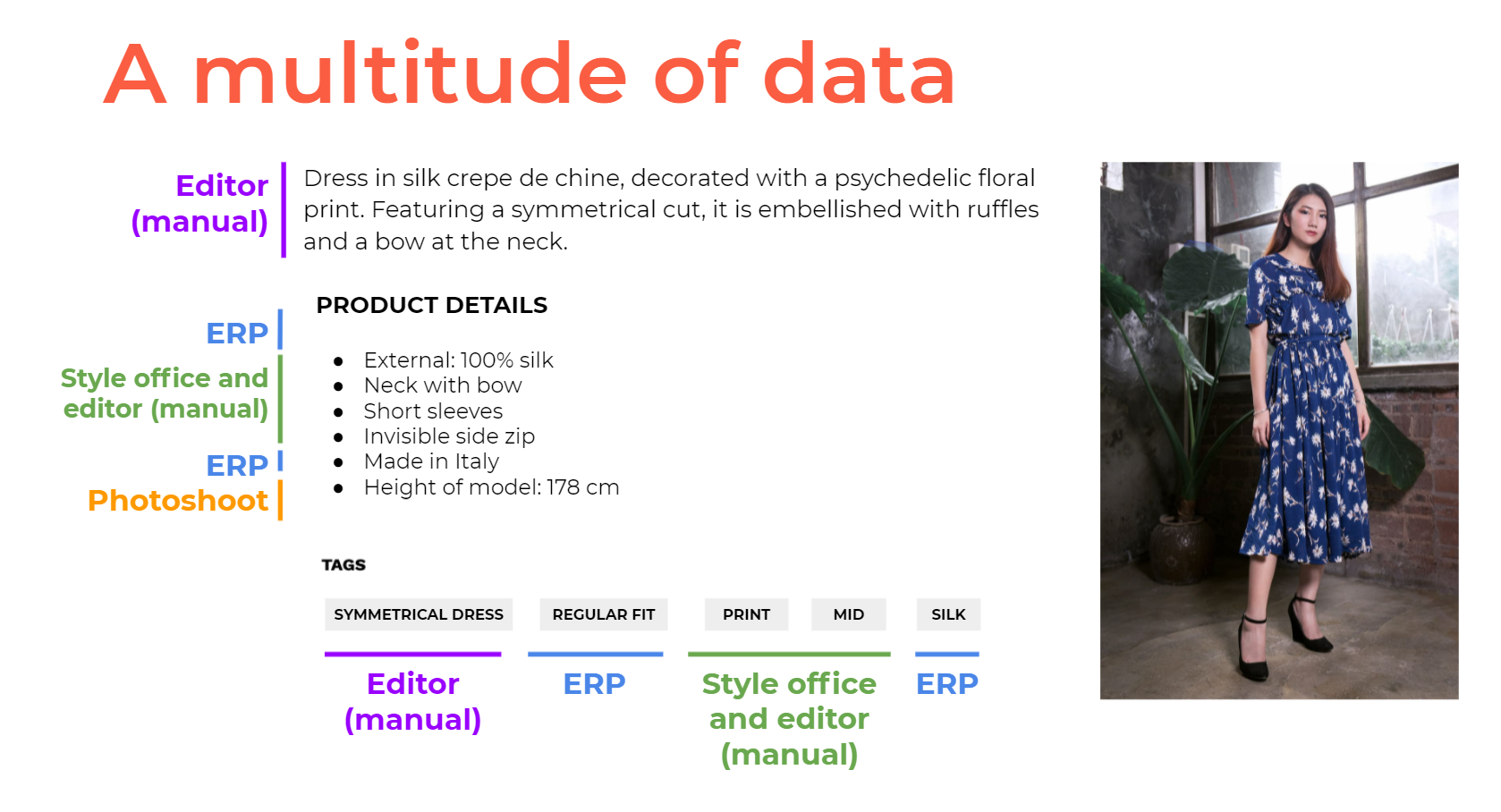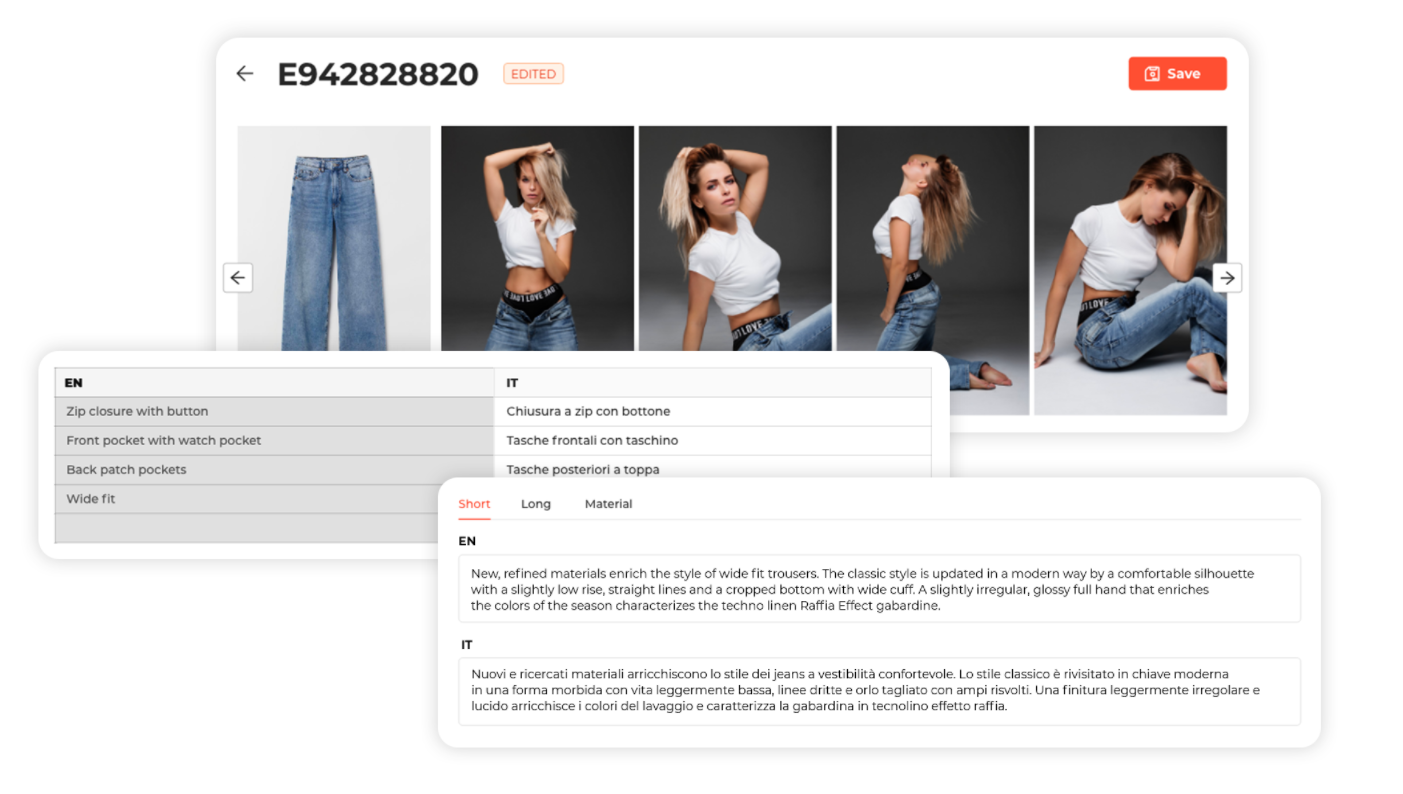
Articles
AI and Fashion – How technology can (re)shape the customer digital experience
You are here:
Overview
e-Commerce in the fashion industry has undergone massive changes over the last few years. After the remarkable online revenue increase registered during the pandemic, many apparel, retail and fashion brands re-allocated their budget to accelerate digitalization roadmaps.
In this context, customer experience (CX) emerged as a clear strategic investment focus.
This article will discuss the value of an engaging digital CX for fashion e-commerce and how AI technology can reshape the digital shopping journey around customers’ intent and desires, thanks to:
- Curated, rich, and consistent digital catalogs
- Deep, precise, and intimate customer knowledge
Customer Experience in the Fashion Industry
Customer experience has always been a top priority for retail and fashion brands in physical stores. Sales assistants are specifically trained to take care of shoppers as soon as they cross the store’s entrance. Associates must consistently convey the brand’s values and identity, understand tastes and preferences, and provide a concierge-like experience. This shopping journey directly impacts brand loyalty, buying frequency, and shopping bag size.
However, replicating the same level of attention and curation online is difficult. The whole experience is simply different. Customers are in front of a screen on their devices with no human interaction. Emotions, expressions, and feelings are difficult to detect and cater to.
With this lack of information, fashion brands should find alternative ways to enhance the e-commerce experience. While a satisfying digital CX is a revenue accelerator, a bad one has negative consequences that go well beyond losing a sale, impacting brands’ value and perception.

What should fashion e-commerce managers focus on to design engaging CX?
- A compelling and comprehensive digital catalog
- A deep and intimate customer knowledge
The Digital Catalog
The dark side of catalog management
Digital catalogs are crucial assets for every e-commerce merchant, especially in the fashion industry. They represent the most immediate way to share the brand’s values and credo. Having an on-brand catalog which is consistent across every touchpoint, physical or digital, can positively influence the CX.
However, despite its importance, catalog creation is still a time-consuming, manual, and error-prone process. Product and merchandising information is scattered throughout several organizations, systems, and documents, if not buried in people’s heads. Editors and copywriters have to scout data throughout ERPs, PIMs and asset databases, sourcing it from different departments, and searching through Excel files to manually tag and describe products.

Performing these activities with tight deadlines and thousands of SKUs can lead to suboptimal outputs in terms of quality. The digital catalog may contain mistakes and inconsistencies, mistagged products, or less than appealing descriptions. All of this directly impacts the CX and, with it, e-commerce business KPIs.
Moreover, the window from availability to ready-to-sell products is routinely somewhere between 60 and 120 days. During this lead time, goods lay in warehouses as idle inventory.
AI to streamline the catalog enrichment workflow
New technology solutions can help manage the entire catalog enrichment workflow, from the photoshoot to ready-to-sell products on the online store. Catalog Builder, the new catalog automation solution by ContentWise Fashion, leverages visual AI algorithms that learn a brand’s style, codes, and tone of voice by ingesting images, photos, tags, and descriptions from past collections.
Once trained, the algorithm uses new collections’ product artwork and catalog photoshoot images to automatically generate multilingual, on-brand tags and descriptions for each product.

Editors and e-commerce managers can control the entire process from a single dashboard that also serves as a central information repository, removing the hassle of searching data in multiple locations and applications.
Process owners can still validate the automatically-generated content and add their human touch, if needed. The solution easily allows users to edit and modify descriptions and tags.
The result is a consistent digital catalog, with high-quality, on-brand tags and descriptions, in a fraction of the time previously needed (days instead of months).
Customer Knowledge
What do customers expect from fashion e-commerce?
Technology behemoths like Amazon, Facebook, and Google have raised customers’ expectations. Today, shoppers want a smooth and personalized e-commerce journey, where they can easily find what they want, the moment they want it, and the way they want it.
That requires a real-time, adaptive user interface (UI) able to detect and understand customers’ tastes, preferences, and intent to create a smooth interactive discovery experience.
This is a tall order. Every shopper is different, so the CX should also be unique to each individual user. This is why deep customer knowledge is crucial.
Imagine the same search results for two very different personas, Giulia and Maria.

What Maria means with “red skirt” is different from Giulia. Maria may need to browse several pages to find what she wants. Rather than sifting through endless poorly matched product choices, she is more likely to leave and try some other website.

In another example, two shoppers have an identical demographic profile, but the probability that they both have the same tastes is low. Style is very personal and unique. So similar search results may not be as appealing to one as they are for the other.
Leverage AI for a personalized e-commerce experience
Demographic segmentation alone cannot add granular enough data to make the CX compelling and engaging. Just like Netflix is doing in the video domain, it is possible to apply AI technology to provide a uniquely personalized experience at every digital touchpoint also to fashion e-commerce.
ContentWise Fashion’s Personalizer processes navigation data along with historic and demographic information to adapt in real-time the UI to individual customers. At every digital touchpoint, the experience is designed for the single shopper, not for a cluster. This is what we call segment-of-one personalization.
The AI-powered technology understands habits, moods, and intent to help customers during their shopping journey, showing them similar products to complete the look or suggesting good alternatives to the current selection.

Conclusion
The application of AI technology to the fashion industry presents tremendous opportunities to shape a compelling and engaging customer experience while resolving productivity challenges that are pervasive in the industry.
With this in mind, ContentWise created ContentWise Fashion, the offering for the fashion and apparel retail industry, focused on using AI to simplify digital content creation, accelerate time-to-market, deliver a uniquely personalized experience and increase e-commerce sales.
CW Fashion Catalog Builder automates time-consuming catalog production tasks and ensures on-brand consistency and tone of voice at scale, leaving editors and content managers time to focus on adding value activities.
CW Fashion Personalizer leverages deep product information to match customer preferences and tastes and deliver segment-of-one personalization in real-time and at scale.
Together, these technologies represent concrete steps toward the application of AI to realize the full potential of digital commerce.
Related News
Articles
Like VOD but in four dimensions? FAST channel programming automation and personalization with Contentwise Playlist Creator
Thanks to automation and AI, Playlist Creator, leverages content recommendation recipes to generate FAST channel playlists that are fed to cloud playout systems.
